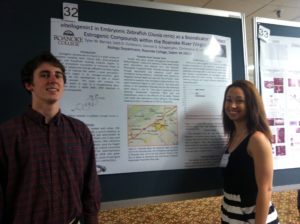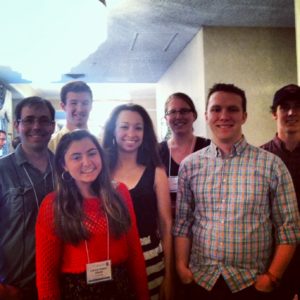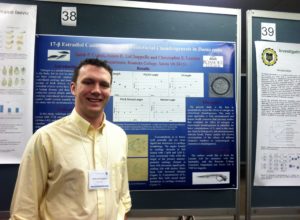Dr. Chris Lassiter and six of his students recently attended the Mid-Atlantic Society for Developmental Biology conference on April 19-21, 2013 where four of those students presented posters. Ashley Briggs (’13) presented “Estrogen Replacement Therapy Prevents Cardiac and Vascular Failure in the ‘Listless’ Zebrafish (Danio rerio) Developmental Model”. Other authors on that poster included two former RC students (Rachel Naylor, Tarenne Underwood) and undergrads from VMI.
Tyler Barnes (’14) and Seth Fortmann (’15) presented “vitellogenin1 in Embryonic Zebrafish as a Bioindicator to Detect Estrogenic Compounds with the Roanoke River (Virginia)”. Other authors on that poster included one former RC student (Garrett Schaperjahn). Adam LaChappelle (’14) presented “17-beta Estradiol Causes Craniofacial Chondrogenesis Defects in Zebrafish (Danio rerio)”. Other authors on that poster included one former RC student (Sarah Cohen). Ben Walker (’16) and Gabi Roberto (International Student, Brazil) also attended the conference.
Dr. Lassiter tries to take students to conferences yearly. In 2011 he took five students to a regional conference, two students to an international conference in 2012, and six students to a regional conference this year. He explains that when he takes students to conferences he is very proud of what they have accomplished in the lab and as presenters. “For the scientific process to be truly complete, the research must be communicated to others and evaluated by peers. At a conference, many of my students have been mistaken for graduate students because of the quality of their work and presentation.”
Dr. Lassiter also states that “working with students in the research lab is very rewarding. When we do research in the laboratory, I follow an apprenticeship model with students; they learn techniques and skills from me early in the process and end up running true independent studies of scientific inquiry.”

Dr. Lassiter advises that “If a student is interested in research, the first step is to ask. Don’t hesitate to contact professors who are doing work that intrigues you. Meet with professors and talk about research possibilities. There’s no substitution for independent, yet mentored, research.”

